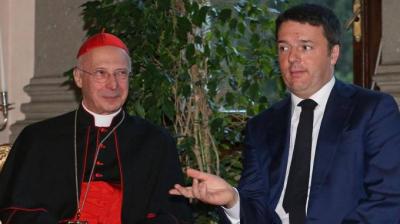Frosty reception for Cardinal's remarks on Civil Union bill

ROME --The head of the Italian Episcopal Conference (CEI) Cardinal Angelo Bagnasco was on the receiving end of a particularly frosty reception in parliament after his request to hold a secret vote in the ballot on the civil partnership bill. Both the Italian Prime Minister Matteo Renzi and the Senate President Pietro Grasso had something to say on the subject.
The bill under discussion is Cirinnà which, if passed, would extend some of the rights and protections currently only enjoyed by married heterosexual couples to committed gay couples.
It was on Thursday that Cardinal Bagnasco called for the vote on the bill, which many Catholics and conservatives are opposing, especially due to its provision for stepchild adoption, to be a secret one. “We hope freedom of conscience on fundamental issues for the life of society and individuals is not only respected but promoted with a secret ballot,” he urged.
Italy’s Premier, speaking on local radio station Anch’io on Friday, told listeners that it was not up to the Italian Church to decide whether a vote held in parliament on a bill to regulate civil unions should be a secret ballot. “It is up to parliament and I say that with respect for Cardinal Bagnasco,” he reported, “I would very much like the idea that parliamentarians can give an answer for their vote and explain it.”
Pietro Grasso also spoke out saying, “It’s a right for everyone to be able to express themselves; there’s freedom of expression. But on the procedures I think it is the prerogative of the republican institutions to decide.”
It will be a decision for the President of the Senate to make, once he has weighed up all arguments. One of the bill’s main supporters for the Democratic Party Senator Sergio Lo Giudice, when phoned for comment on Bagnasco’s statement, said, “The Church leaders have every right to intervene in the public debate and express a position on the content,” of the law, but “intervening on the timetable and voting procedures entirely deserves to be treated as interfering with state affairs.”
In Italy the principle of separation between the Church and the State is upheld in Article 7 of the Constitution.


